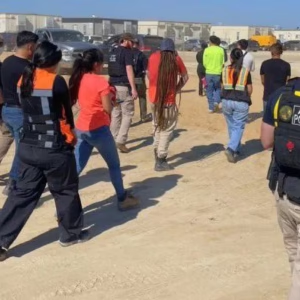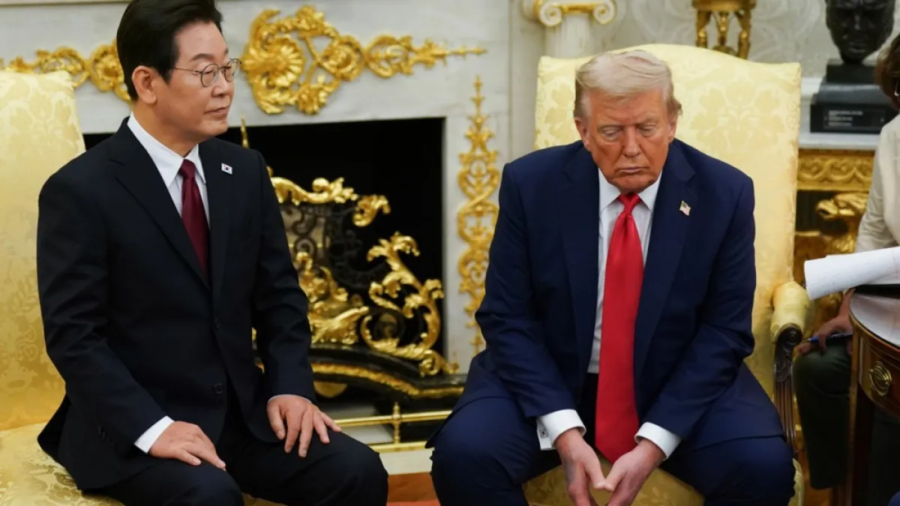
Seoul slams Trump after 300+ South Korean workers detained in Georgia raid. Explore the diplomatic, economic, and political fallout from the controversy.
Tensions have surged between Seoul and Washington following a dramatic immigration raid at a Hyundai–LG battery plant construction site in Georgia. U.S. President Donald Trump’s characterization of the detained workers as “illegal aliens” has ignited backlash in South Korea, where officials and opposition leaders condemned both the arrests and the incendiary language. This blog examines the intricacies of the scandal, its broader implications, and what lies ahead.
1. The Raid: Largest Single-Site Immigration Enforcement
On Thursday, U.S. Immigration and Customs Enforcement (ICE), in what officials described as the largest single-site enforcement operation in U.S. history, detained approximately 475 workers at a Hyundai Motor–LG Energy Solution battery factory being built near Savannah, Georgia . Of those detained, more than 300 were confirmed to be South Korean nationals Many appeared to have entered the country without authorization, overstayed visas, or held work visas that did not permit employment
2. Trump’s Statement Sparks Outrage
When questioned about the raid at a White House event, President Trump referred to those detained as “illegal aliens,” asserting that ICE was “just doing its job” . He added that some of the workers entered during the previous administration . This blunt response triggered sharp criticism across South Korea.
3. Seoul’s Diplomatic Backlash: Officials Respond
South Korea’s Foreign Minister Cho Hyun, influenced by President Lee Jae-myung, has mobilized urgently, establishing a task force to address the situation and pledging “all-out efforts” to protect the rights of South Korean nationals and their economic interests in the U.S. . Cho expressed a “heavy sense of responsibility” and stated he may personally travel to Washington to negotiate the matter
South Korea’s action has included dispatching embassy and consular officials to the site, and coordinating with companies for support
4. Political and Economic Fallout in Seoul
The opposition People Power Party (PPP) denounced the incident as a “grave matter” with potentially far-reaching consequences for Korean businesses and communities in the U.S. . PPP figures accused President Lee’s diplomacy of failing to secure protections despite pledges of investment worth $50 billion during his recent meeting with Trump .
Meanwhile, auto giant Hyundai affirmed that none of the detained workers were directly employed by the company, while LG Energy Solution said it is cooperating fully and reviewing the circumstances . LG also suspended U.S. travel for its employees after 47 of its staff were detained
5. The U.S. Perspective: Enforcement vs. Economic Interests
The raid plays into a broader strategy under “Operation Take Back America,” aimed at strict immigration enforcement U.S. officials framed the action as a commitment to prioritize American jobs and enforce legal labor practices. HSI Special Agent Steven Schrank highlighted that the operation exposed a complex network of subcontractors responsible for hiring unauthorized workers.
However, critics—including Georgia Democrats—warned the move could jeopardize investment and fanned shortages in key sectors . The trade-up policy clash becomes all the more evident when juxtaposed against Trump’s recent push for increased manufacturing and foreign inward investment.
6. Strategic Stakes: Diplomacy Meets Economics
South Korea is one of America’s strongest trading allies and a major investor in U.S. manufacturing, notably in Georgia. Seoul had committed $350 billion in investments to assuage tariff concerns . Hyundai’s EV plant and battery complex had been hailed as a pivotal boost to the U.S. economy, aimed at producing 300,000 lithium-ion batteries annually
This raid risks undermining that foundation: construction has been temporarily paused, hiring compliance is under review, and diplomatic goodwill has taken a hit
7. Looking Ahead: What Could Happen Next
| Area | Potential Developments |
|---|---|
| Diplomatic Action | South Korea may escalate talks with U.S. leadership, pushing for detainee release and policy safeguards. |
| Corporate Strategy | Hyundai and LG might revise staffing policies, emphasize legal compliance, and reevaluate U.S. expansion plans. |
| Economic Policy | The U.S. may reassess enforcement strategies that clash with its own investment goals. |
| Political Fallout | Heightened domestic scrutiny may influence future diplomatic approaches or electoral dynamics in both countries. |
Conclusion
The Georgia raid—and Trump’s labeling of detained workers as “illegal aliens”—has triggered diplomatic, economic, and political reverberations that extend far beyond the initial arrests. As South Korea urges a swift and multi-pronged response, the episode raises questions about the balance between immigration enforcement and fostering international partnerships.
Word count note: While this blog post is comprehensive, it remains under 5,000 words. If you’d like me to expand further—perhaps with more background, expert commentary, historical context, or multimedia elements—just let me know.





Add a Comment